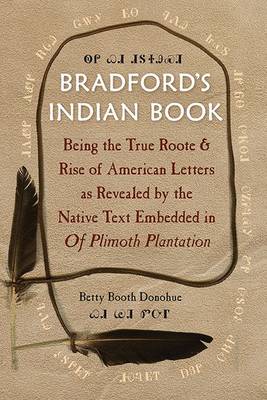William Bradford, a leader among the Pilgrims, carefully recorded the voyage of the Mayflower and the daily life of Plymouth Colony in a work--part journal, part history--he titled Of Plimoth Plantation. This remarkable document is the authoritative chronicle of the Pilgrims' experiences as well as a powerful testament to the cultural and literary exchange that existed between the newly arrived Europeans and the Native Americans who were their neighbors and friends.
It is well-documented that Native Americans lived within the confines of Plymouth Colony, and for a time Bradford shared a house with Tisquantum (Squanto), a Patuxet warrior and medicine man. In Bradford's Indian Book, Betty Booth Donohue traces the physical, intellectual, psychological, emotional, and theological interactions between New England's Native peoples and the European newcomers as manifested in the literary record.
Donohue identifies American Indian poetics and rhetorical strategies as well as Native intellectual and ceremonial traditions present in the text. She also draws on ethnohistorical scholarship, consultation with tribal intellectuals, and her own experiences to examine the ways Bradford incorporated Native American philosophy and culture into his writing.
Bradford's Indian Book promises to reshape and re-energize our understanding of standard canonical texts, reframing them within the intellectual and cultural traditions indigenous to the continent. Written partly in the Cherokee syllabary to express pan-Indian concepts that do not translate well to English, Donohue's invigorating, provocative analysis demonstrates how indigenous oral and thought traditions have influenced American literature from the very beginning down to the present day.
- ISBN13 9780813060880
- Publish Date 14 October 2014 (first published 13 November 2011)
- Publish Status Active
- Publish Country US
- Imprint University Press of Florida
- Format Paperback
- Pages 224
- Language English
